This article highlights the critical hotel distribution channels that can significantly boost accommodation bookings. It addresses the pressing challenge of maximizing occupancy rates and profitability in a competitive market. By leveraging various strategies—such as optimizing direct bookings through websites, utilizing Online Travel Agencies (OTAs), and integrating Global Distribution Systems (GDS)—hoteliers can effectively enhance their visibility and attract more guests.
Furthermore, the article presents compelling case studies and statistics that illustrate the positive impact of these channels on occupancy rates. For instance, hotels that prioritize direct bookings often see a marked increase in revenue, as they can avoid the high commission fees associated with OTAs. In addition, integrating GDS can streamline operations and expand reach, allowing properties to connect with travel agents and corporate clients more efficiently.
To generate desire, the article emphasizes the importance of a multi-channel approach. By diversifying distribution strategies, hotel owners can mitigate risks and adapt to changing market conditions. This not only enhances their competitive edge but also fosters long-term relationships with guests, ultimately leading to increased loyalty and repeat business.
In conclusion, the article provides actionable recommendations for hotel and restaurant owners looking to improve their distribution strategies. By focusing on optimizing direct bookings, utilizing OTAs, and integrating GDS, properties can significantly enhance their booking potential. Are you ready to take your hotel’s distribution strategy to the next level?
The hospitality industry is experiencing a significant shift as hotels explore innovative strategies to enhance bookings and revenue streams. With the advent of digital marketing and sophisticated revenue management solutions, accommodations now have an extensive array of distribution channels at their fingertips. This article examines ten essential hotel distribution channels that can dramatically increase bookings, focusing on strategies that not only maximize visibility but also encourage direct engagement with guests.
How can hotels adeptly navigate this intricate landscape to gain a competitive advantage and secure long-term success?
Lights On provides a robust suite of digital marketing and revenue management solutions tailored for the hospitality sector. Their offerings include website management, performance marketing, and social media engagement, all designed to boost brand visibility and optimize revenue streams. By leveraging data-driven insights, Lights On equips accommodations and restaurants to navigate market complexities, engage potential guests effectively, and maximize occupancy rates. This comprehensive approach is vital for understanding the diverse hotels distribution channels that can significantly enhance bookings.
As we look ahead to 2025, the focus on revenue management will intensify, with accommodations increasingly acknowledging its critical role in driving profitability. Total Revenue Management (TRevPAR) goes beyond just room rates; it encompasses all revenue streams, including food and beverage sales and event hosting. This holistic perspective empowers accommodations to pinpoint opportunities for improving overall profitability.
Consider successful case studies that highlight the tangible benefits of effective revenue management. For instance, a boutique hotel in Jaipur experienced a remarkable 22% increase in RevPAR within just six months of implementing new strategies. This showcases the potential for revenue uplift through targeted management practices. Moreover, AI-driven revenue management systems facilitate real-time pricing adjustments based on demand fluctuations, enabling accommodations to respond swiftly to market conditions.
As the global revenue management system market continues to grow, integrating advanced technologies and data analytics will be essential for accommodations aiming to enhance their financial performance. By adopting a proactive revenue management strategy, accommodations can not only boost their reservation rates but also secure a competitive edge in an increasingly saturated market.
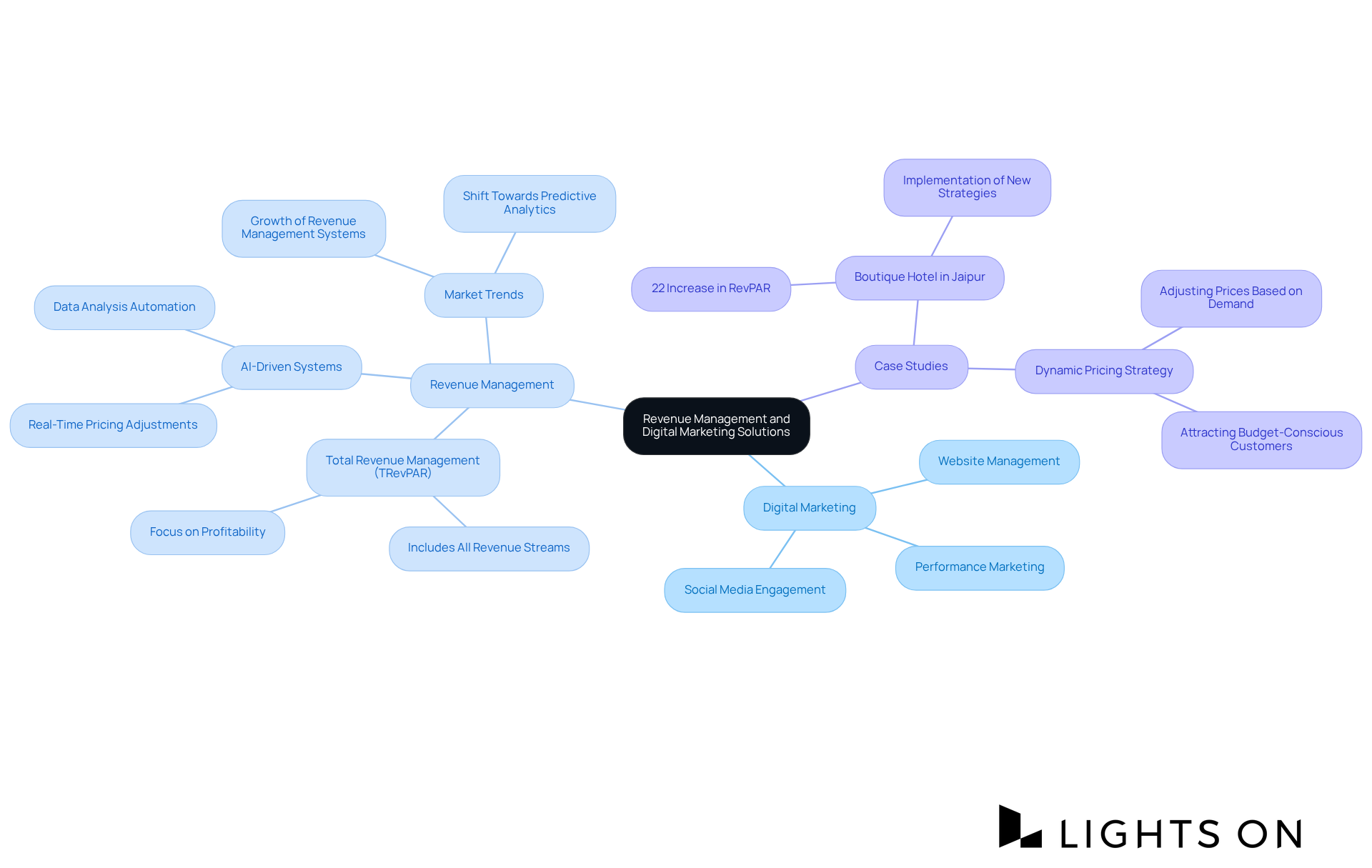
Direct reservations through your website are essential for maximizing profitability in the hospitality sector. By prioritizing user experience in website design and implementing effective call-to-action strategies, accommodations can significantly increase direct bookings. This approach not only minimizes the average commission fees charged by third-party reservation platforms—typically ranging from 15% to 30%—but also fosters stronger connections with guests. For instance, establishments that optimize their reservation systems for mobile users have seen a notable rise in direct reservations, with over 65% of same-day bookings now made on mobile devices.
Moreover, employing customized offers and loyalty initiatives can further enhance the likelihood of direct reservations. Case studies reveal that establishments executing targeted 'Book Direct' campaigns have achieved increases of 15-20% in direct bookings, showcasing the effectiveness of strategic marketing efforts. Additionally, maintaining a flawless Google Business Profile and engaging with visitors on social media can boost brand visibility, making accommodations more appealing to potential patrons.
To ensure a seamless reservation experience, accommodations should focus on optimizing their websites for speed and user-friendliness. A mere one-second delay in page load time can result in a 7% decrease in conversions, highlighting the necessity for efficient website performance. By adopting these best practices, establishments can not only enhance their direct reservations but also elevate overall guest satisfaction and loyalty.
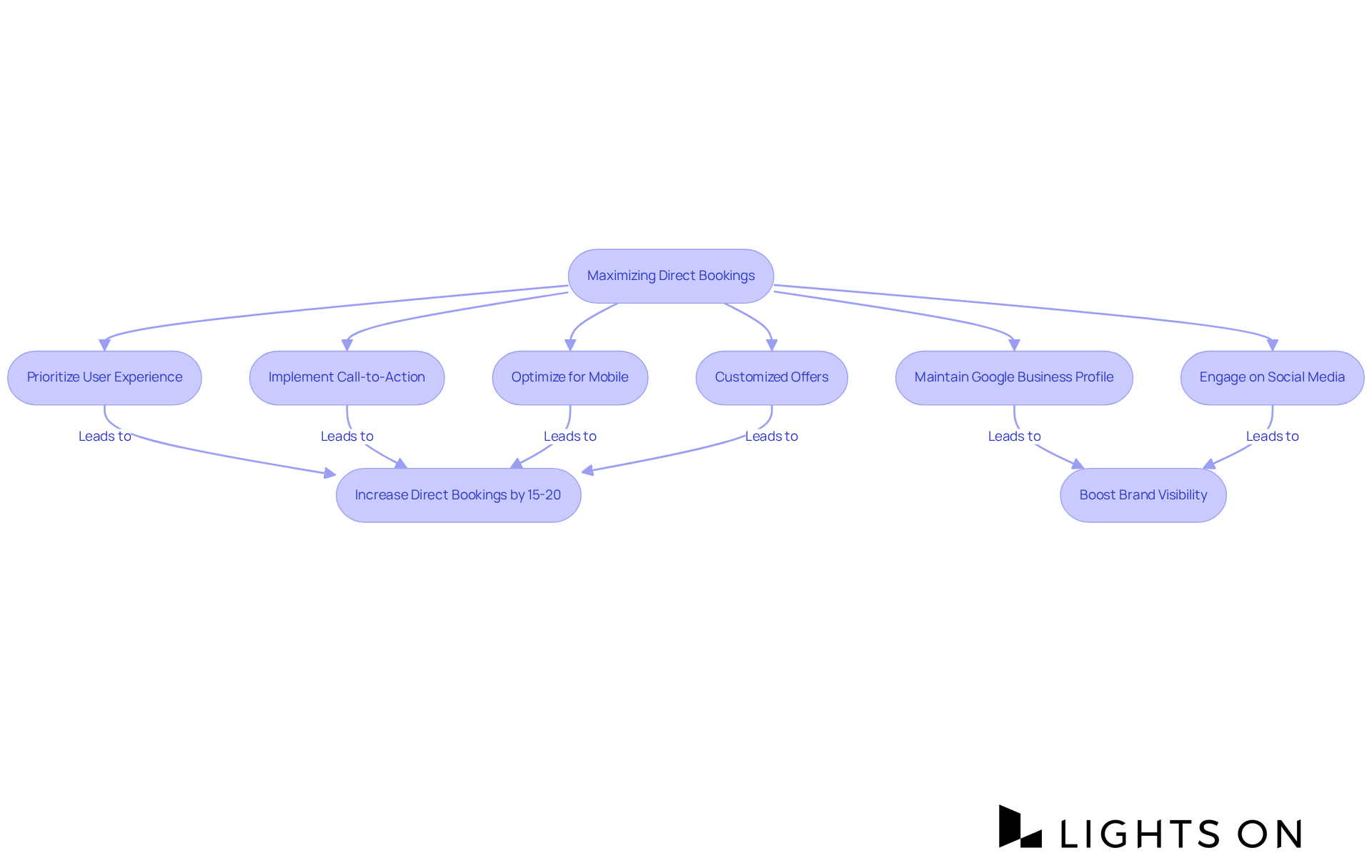
Online Travel Agencies (OTAs) play a crucial role in expanding a property's market reach by utilizing hotels distribution channels. By listing on popular OTAs, accommodations can connect with a vast audience of travelers who might not know their brand. However, managing their presence on hotels distribution channels is essential. Competitive pricing and appealing listings are key. Utilizing promotional strategies and optimizing content can help accommodations stand out in the crowded OTA marketplace.
Statistics reveal that hotels distribution channels, such as OTAs, account for a significant portion of hotel bookings, with 77% of reservations in Europe made through these platforms. This highlights the need for a strategic approach to managing hotels distribution channels, especially given the fluctuating commission rates that can affect profitability. Hotels should adopt best practices, such as:
As the hospitality landscape evolves in 2025, the influence of hotels distribution channels, particularly OTAs, continues to expand. They not only enhance visibility but also shape visitor expectations regarding reservation experiences. However, accommodations must remain aware of the challenges associated with OTA dependence, including high commission fees and limited control over guest interactions. By leveraging data analytics to understand guest preferences and refine their offerings, accommodations can effectively manage their OTA presence, boost reservations, and minimize commission costs, ultimately enhancing profitability and guest satisfaction.
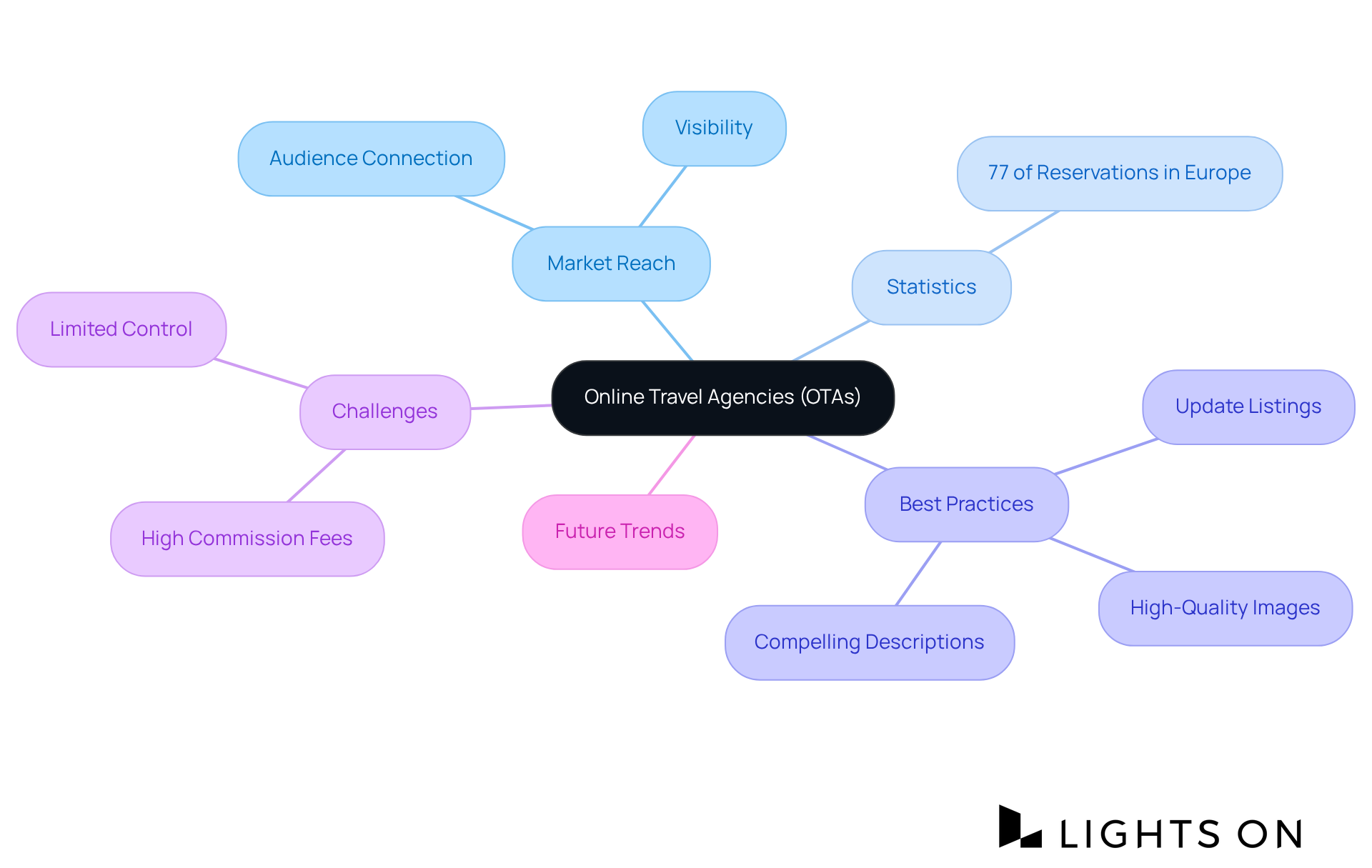
Global Distribution Systems (GDS) function as essential hotels distribution channels that connect accommodations with travel agents and corporate clients. By integrating with a GDS, accommodations can significantly boost their visibility among business travelers, who frequently depend on travel agents for their bookings. This system provides real-time access to availability and pricing, streamlining the reservation process for agents acting on behalf of their clients. For instance, establishments utilizing GDS have reported an average daily charge (ADR) of €179, second only to direct reservations, highlighting the financial benefits of this channel.
To fully leverage the advantages of GDS, accommodations must ensure their profiles are not only current but also enticing. This means maintaining accurate rates and availability, which can lead to increased reservations and enhanced guest satisfaction. Additionally, accommodations should consider implementing targeted promotions and special offers aimed at corporate clients, while also using analytics to comprehend reservation trends and adjust strategies accordingly. Case studies illustrate that establishments like the Evergreen Laurel have successfully broadened their international customer base through GDS, showcasing its effectiveness in accessing previously unreachable markets.
Moreover, insights from industry leaders stress the importance of regular updates and performance evaluations of GDS listings to stay competitive. As hotels distribution channels like GDS continue to grow—evidenced by a remarkable 54% increase in reservations from January to May 2024 and recognized as the fastest-growing distribution channel since 2023—hotels that strategically enhance their GDS profiles will be better positioned to capture the lucrative corporate travel market and boost their overall revenue. By leveraging the expertise of Lights On, accommodations can adopt tailored marketing strategies that further enhance their GDS presence and drive up reservations.

Metasearch engines like Kayak and Trivago play a pivotal role in the hospitality sector by allowing travelers to compare prices across various booking platforms. This capability addresses a significant challenge for accommodations: standing out in a crowded market. By ensuring their prices are competitive and their listings are optimized, hotels and other lodging options can attract a greater number of visitors from these platforms.
Furthermore, accommodations can harness metasearch promotion to enhance their visibility and drive direct bookings. This strategy not only increases exposure but also leads to higher occupancy rates, which is essential for maximizing revenue. In addition, leveraging these platforms effectively can create a more favorable perception among potential guests, ultimately influencing their booking decisions.
To capitalize on this opportunity, hotel and restaurant owners should consider integrating metasearch strategies into their marketing plans. By doing so, they can not only improve their market presence but also foster a direct relationship with their guests, paving the way for increased loyalty and repeat business.
Are you ready to elevate your accommodation's visibility and occupancy levels?
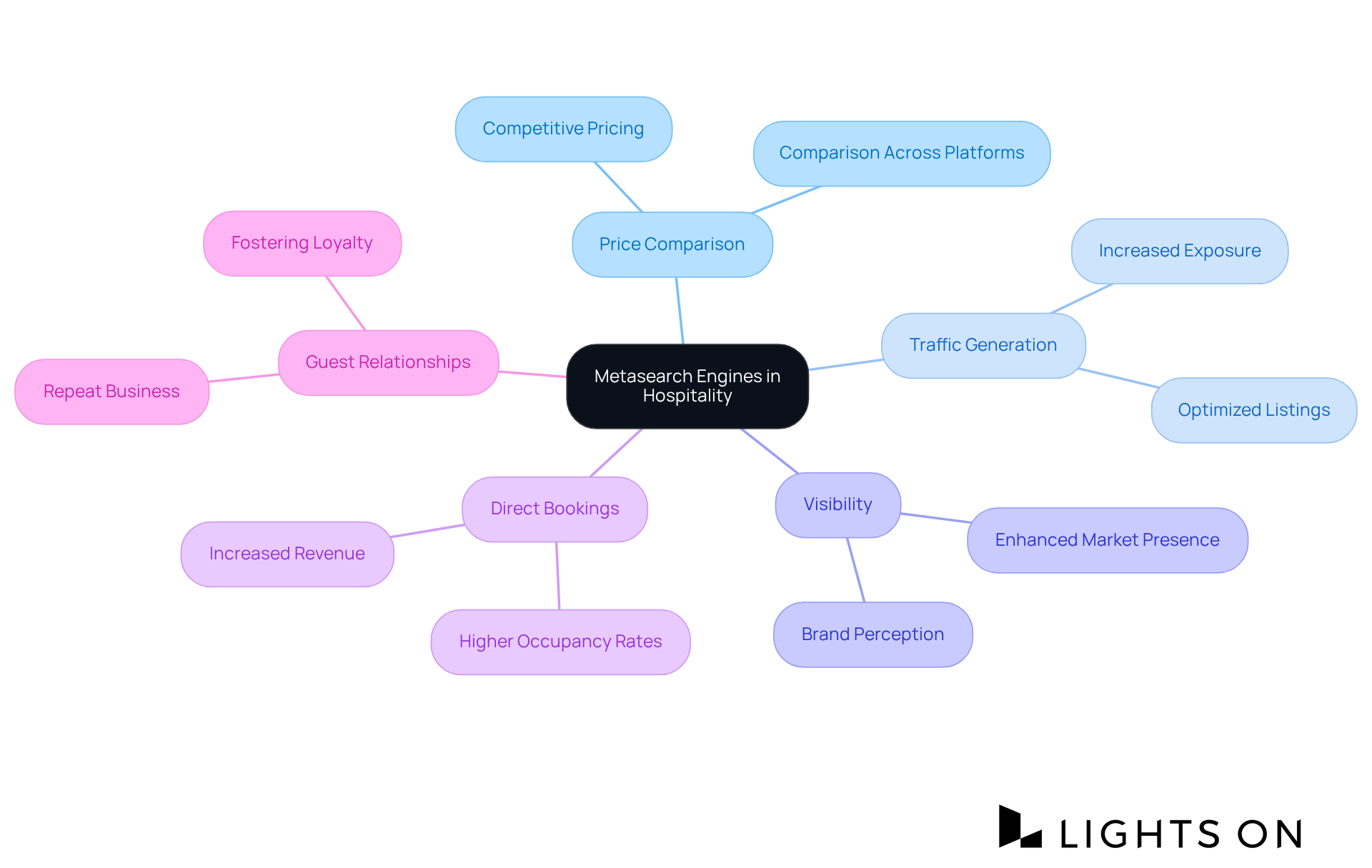
Wholesalers: Leveraging Bulk Bookings for Increased Occupancy
Wholesalers are pivotal in the hospitality industry, purchasing rooms in bulk and reselling them to travel agents or directly to consumers. This strategy can significantly benefit accommodations aiming to enhance occupancy during off-peak periods. By establishing relationships with reliable suppliers, hotels can ensure a steady stream of reservations while negotiating favorable prices that protect their profitability.
To fully harness the advantages of working with wholesalers, hotels should implement targeted marketing strategies:
Targeted Promotions: Create exclusive packages or promotions specifically for wholesalers that cater to their clientele. Consider offering reduced rates for group bookings or additional amenities for larger gatherings.
Regular Communication: Keep open lines of communication with wholesalers. Regular updates about availability, pricing changes, and special events can improve hotels distribution channels and drive more reservations.
Performance Monitoring: Track the performance of wholesalers by analyzing booking trends and occupancy rates. This data is invaluable for adjusting strategies and negotiating better terms based on performance metrics related to hotels distribution channels.
Niche marketing requires collaboration with wholesalers to reach niche segments, such as international travelers and tour groups, which may be difficult to access through hotels distribution channels. Tailoring services for these groups can significantly boost occupancy levels.
Price Parity Management: Ensure that discounted rates offered through wholesalers do not undermine direct booking efforts. Establish clear pricing and availability guidelines to maintain brand integrity.
Insights from hospitality experts indicate that successful negotiations with wholesalers hinge on understanding market dynamics and proactively managing rate parity. This approach ensures that the benefits of bulk reservations translate into higher occupancy without compromising the establishment's brand integrity. As the industry evolves, strategically leveraging wholesalers will remain essential for properties aiming to maximize revenue potential while maintaining a competitive edge.

Travel agents play a pivotal role in enhancing the visitor reservation experience through tailored service and extensive knowledge. They leverage their deep understanding of client preferences and current travel trends to collaborate with accommodations, crafting customized packages and promotions that resonate with specific demographics. This strategic partnership not only boosts bookings but also fosters loyalty among visitors.
To maximize market reach and tap into diverse customer bases, accommodation owners must forge strong relationships with both local and international travel agents utilizing hotels distribution channels. Furthermore, integrating AI travel agents can significantly enhance marketing strategies by delivering data-driven insights into customer preferences. By actively pursuing collaborations with travel agents and harnessing technology, property owners can create tailored experiences that serve as crucial differentiators in attracting and retaining visitors.
In conclusion, the synergy between travel agents and accommodations is essential. It not only improves the visitor experience but also drives business success. Are you ready to explore how these partnerships can transform your approach to hospitality?
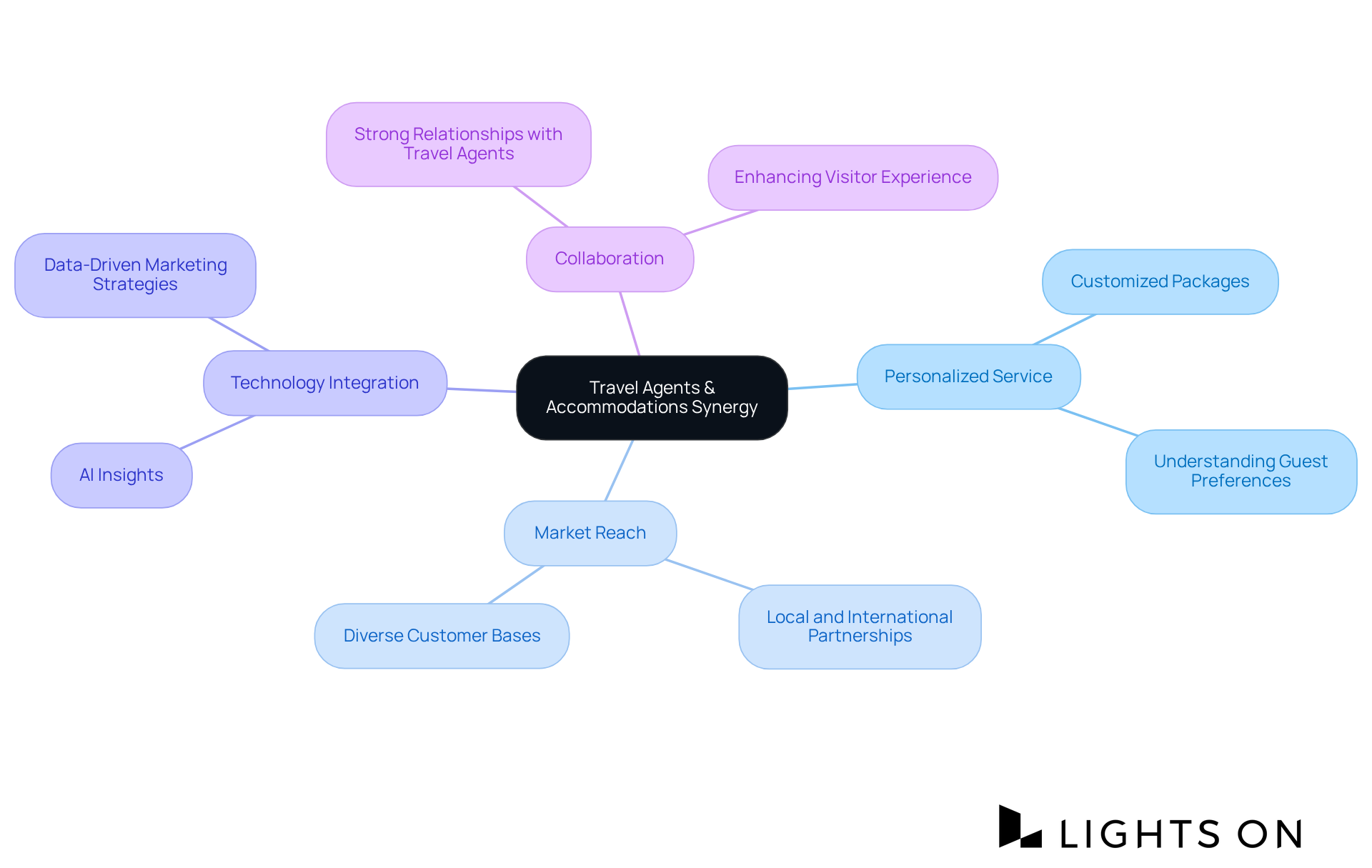
Social media platforms like Instagram and Facebook are essential for engaging potential customers and promoting accommodations. By creating visually appealing content and dynamic campaigns, hotels can attract interest and drive reservations. Here are some targeted strategies to elevate your social media marketing:
By implementing these strategies, establishments can effectively harness social media to increase reservations and enhance their overall marketing efforts.

Email marketing emerges as a formidable tool for nurturing client relationships and driving repeat bookings in the hospitality sector. It addresses a critical challenge: how to keep past visitors engaged and informed. By efficiently categorizing email lists, accommodations can deliver tailored offers that resonate with previous guests, ensuring they remain connected to special promotions and upcoming events.
Regular newsletters that spotlight local attractions and hotel updates not only sustain interest but also motivate visitors to return. Furthermore, implementing automated email campaigns for post-stay follow-ups significantly enhances customer loyalty. Personalized communication makes individuals feel valued, fostering a deeper connection. In fact, personalized emails can lead to a 29% greater open rate and a 41% increased click-through rate compared to their non-personalized counterparts. This statistic underscores the tangible benefits of customized messaging in cultivating lasting relationships with visitors.
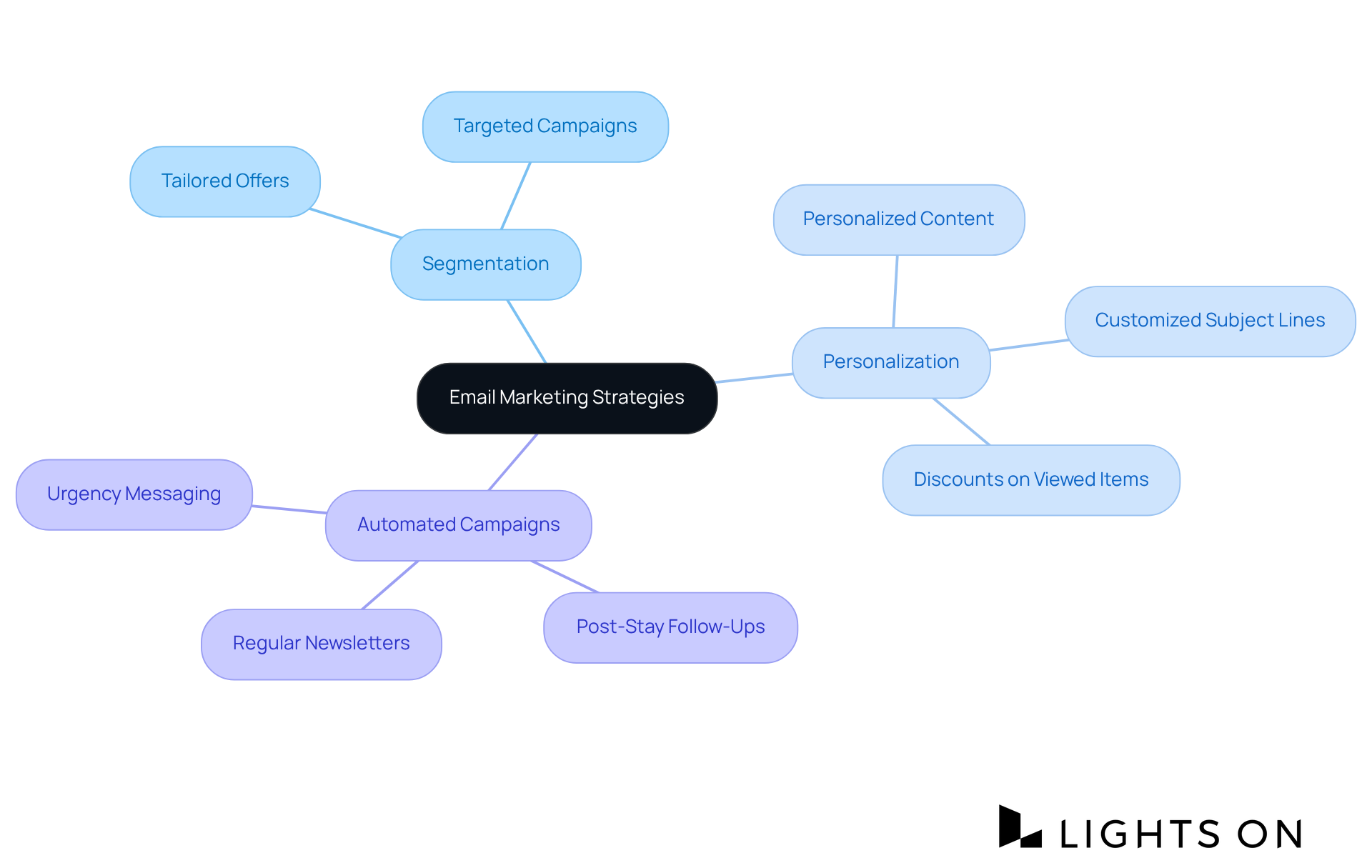
Mobile applications are revolutionizing the hospitality sector, providing visitors with a seamless and convenient way to book accommodations and access services. User-friendly mobile apps empower hotels to streamline the booking process, significantly enhancing the overall visitor experience. For instance, features like mobile check-in have gained immense popularity, with over 260,000 check-ins per week, marking a remarkable 75 percent increase in usage. This functionality not only reduces wait times but also boosts visitor satisfaction by facilitating a smoother arrival experience.
Furthermore, mobile apps enable guests to request room service and explore local attractions, further enriching their journey. The capability to send personalized offers and notifications through these apps fosters deeper engagement and drives bookings. After the launch of Marriott's mobile app, total monthly active users surged by 40 percent, reaching 2.8 million, while revenue growth soared into double digits.
Industry leaders assert that prioritizing customer needs through technology is vital for success. By leveraging mobile applications as part of a broader marketing strategy, hotels can enhance their hotels distribution channels to not only meet but exceed visitor expectations, cultivating loyal patrons who are likely to return and recommend the property to others. Integrating mobile technology into marketing efforts is essential for enhancing guest experiences and maintaining a competitive edge in the ever-evolving hospitality landscape.

Understanding and effectively utilizing essential hotel distribution channels is crucial for maximizing bookings and enhancing profitability in the hospitality sector. By leveraging various strategies, accommodations can not only increase their visibility but also foster stronger relationships with guests, ultimately leading to improved financial performance.
The article highlights several key distribution channels, including:
Each channel presents unique opportunities and challenges, emphasizing the importance of a comprehensive approach to revenue management and digital marketing. Case studies and statistics illustrate how targeted strategies can lead to significant increases in bookings and guest satisfaction.
In a competitive landscape, accommodations must remain proactive and adaptable, continuously refining their marketing strategies to meet evolving traveler expectations. Embracing technology and data analytics will not only enhance visibility across distribution channels but also create personalized experiences that resonate with guests. By prioritizing engagement and optimizing various booking platforms, hotels can secure a competitive edge, ensuring long-term success in the dynamic hospitality market.
What solutions does Lights On offer for the hospitality sector?
Lights On provides a suite of digital marketing and revenue management solutions, including website management, performance marketing, and social media engagement, aimed at boosting brand visibility and optimizing revenue streams.
How does Total Revenue Management (TRevPAR) differ from traditional revenue management?
Total Revenue Management (TRevPAR) encompasses all revenue streams, not just room rates, including food and beverage sales and event hosting, allowing accommodations to identify opportunities for overall profitability improvement.
Can you provide an example of the impact of effective revenue management?
A boutique hotel in Jaipur saw a 22% increase in RevPAR within six months of implementing new revenue management strategies, demonstrating the potential for revenue uplift through targeted practices.
What role does AI play in revenue management for accommodations?
AI-driven revenue management systems enable real-time pricing adjustments based on demand fluctuations, allowing accommodations to quickly respond to market conditions.
Why are direct website bookings important for accommodations?
Direct bookings maximize profitability by reducing commission fees from third-party platforms and fostering stronger connections with guests.
What strategies can accommodations use to increase direct bookings?
Accommodations can enhance direct bookings by prioritizing user experience in website design, implementing effective call-to-action strategies, and offering customized promotions and loyalty initiatives.
How does mobile optimization influence direct reservations?
Establishments that optimize their reservation systems for mobile users have seen significant increases in direct bookings, with over 65% of same-day bookings now made on mobile devices.
What impact does website performance have on conversion rates?
A one-second delay in page load time can lead to a 7% decrease in conversions, highlighting the importance of efficient website performance for maximizing direct bookings.
What is the role of Online Travel Agencies (OTAs) in the hospitality sector?
OTAs expand a property's market reach by connecting accommodations with a large audience of travelers, which can significantly increase bookings.
What best practices should accommodations follow when managing their presence on OTAs?
Accommodations should regularly update listings, use high-quality images, and craft compelling descriptions to enhance their appeal on OTAs.
What challenges do accommodations face when relying on OTAs?
Accommodations may encounter high commission fees and limited control over guest interactions, which can impact profitability and guest satisfaction.
How can data analytics help accommodations manage their OTA presence?
By leveraging data analytics, accommodations can understand guest preferences and refine their offerings, thereby boosting reservations and minimizing commission costs.
Transform your group booking strategies with Lights On and watch your occupancy soar.